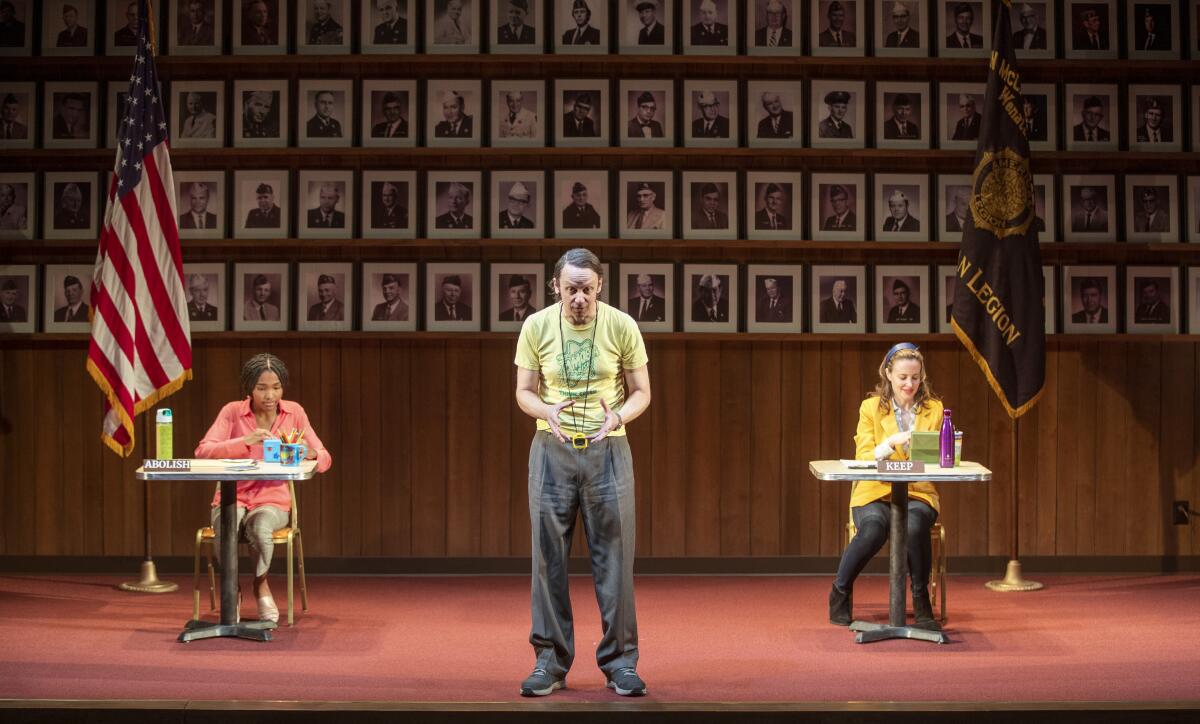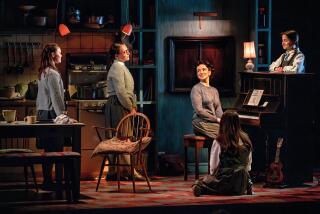Review: ‘What the Constitution Means to Me,’ amended for Los Angeles, retains its power

- Share via
Let me preface this review of Heidi Schreck’s “What the Constitution Means to Me” with a strong plea to every man, woman and mature teenager in the Los Angeles area to see this play, which opened Friday at the Mark Taper Forum.
At a time when the Constitution is being assailed by those who have sworn an oath to defend it, this buoyant and often-stirring civics lesson is the theatrical curriculum Americans desperately need now.
As much a play as a performance piece, “What the Constitution Means to Me” reveals with courageous poignancy the way our nation’s founding legal document intersects with the choices, opportunities, relationships and destinies of those who have had to fight for their foothold in our imperfect democracy.
Schreck is no longer performing in the work. For the L.A. premiere, Maria Dizzia, a New York actress who is part of the same community of downtown artists as Schreck, takes over the role of Heidi.
“Hi, I’m Heidi,” she begins, eliciting scattered laughter from those aware that she is only playing the author, who last spring played herself on Broadway to much adulation. It’s mildly disorienting for those of us who have seen Schreck’s incandescent performance.
But the potential awkwardness of this masquerade doesn’t seem to faze Dizzia. She apes a few mannerisms and copies the occasional cadence. But rather than offer an impersonation, she honors the play by zeroing in on its ultimate import: the never-ending struggle of women to secure the rights that will allow them to determine their own futures.
Dizzia’s relationship to Schreck’s autobiographical material obviously isn’t the same. The personal feeling that colored Schreck’s performance — the way emotion would flush across her face as she recounted a long heritage of women brutalized by husbands and fathers — can’t be duplicated.
The pauses that hauntingly register the intergenerational trauma aren’t as resonant. But Schreck’s story is larger than Schreck. That was the whole point of sharing it. And Dizzia brings to life the maddening, mournful history of how women’s bodies have been abused by our laws and the male-dominated courts imperiously interpreting them.

If the show sounds like it might have a medicinal aftertaste, rest assured that “What the Constitution Means to Me” is playful, often amusing and at times piercing in its pathos. The conceit of the play is that Schreck, a champion orator who racked up college scholarship money when she was a teen giving speeches around the country on the U.S. Constitution, is re-creating a contest in which she came out on top.
The production, directed by Oliver Butler, is set in a kind of diorama version of the American Legion hall in which Schreck shined before her hometown audience in Wenatchee, Wash. The set isn’t meant to be naturalistic. The character of Heidi explains that scenic designer Rachel Hauck helped her reconstruct it from her dreams. “It’s like one of those crime victim drawings,” she says with characteristic light mockery.
Mike Iveson, dressed in Legionnaire regalia, marches onto the stage to announce the contest questions and enforce the rules. The audience is asked to imagine itself as the older white men who originally served as judges. Patrick Swayze of “Dirty Dancing” is invoked to call us back to the hormonal storm of those teenage years.
The freedom with which this Heidi steps in and out of the play allows her to become her 15-year-old self without any theatrical tricks. “So here I am,” Dizzia deadpans. “I’m 15.”
And just like that, the character is transformed into that excitable, overeager and, in her own words, “psychotically polite” young woman, who understands that to win (which is her main goal) she must draw a personal connection between herself and the Constitution. She’s too young to have fully processed all that she has learned about her family, including the sorry tale of her great-great-grandmother, who came from Germany as a catalog bride and died from melancholia at age 36, or the harrowing saga of her grandmother, whose second husband beat the children and fathered two babies with one of them.
Why wasn’t the law on the side of these vulnerable women? By switching between her teenage and adult identities, Heidi is able to movingly contextualize in legal history the stories of her female relatives. A walk through a couple of crucial constitutional amendments expands our understanding of the fight for equality that rages on today.
The subject of reproductive freedom is at the center of “What the Constitution Means to Me.” An audio recording of Supreme Court justices meditating stodgily on birth control wryly illuminates what an uphill climb it has been. Heidi elucidates the intricate constitutional argument that led to the watershed Roe vs. Wade decision. But it’s her private experience with abortion that drives home the point of just what’s at stake in these frenzied political battles.
“The personal is political” was a rallying cry of the feminist movement. “What the Constitution Means to Me” personalizes a political discussion that is routinely drowned out in ideological rancor.

The humanity of the play extends to Iveson, who bares his scars as a gay man after being set free from his Legionnaire drag. Dizzia, too, is given the opportunity to eventually drop the Heidi mask.
The play concludes with Dizzia matching wits with a real-life teenage debater on the question of whether the U.S. Constitution should be preserved or abolished. (Rosdely Ciprian, who rotates with L.A.-based debater Jocelyn Shek, gamely reprised her Broadway performance at Friday’s opening.)
In ending “What the Constitution Means to Me” in this way, Schreck underscores that this living document, which has shaped our collective past, will be reshaped by future generations who are still waiting for America’s democratic promise to be fulfilled. The pocket Constitutions that are passed out to audience members show faith in the ability of “we the people” to move this republic forward.
'What the Constitution Means to Me'
Where: Mark Taper Forum, 135 N. Grand Ave., L.A.
When: 8 p.m. Tuesdays-Fridays, 2:30 and 8 p.m. Saturdays, 1 and 6:30 p.m. Sundays, through Feb. 28 (check for exceptions)
Tickets: $59-$175 (subject to change)
Info: (213) 972-4400 or www.centertheatregroup.org
Running time: 1 hour, 45 minutes (no intermission)
More to Read
The biggest entertainment stories
Get our big stories about Hollywood, film, television, music, arts, culture and more right in your inbox as soon as they publish.
You may occasionally receive promotional content from the Los Angeles Times.










